1972-73 in Australia was marked by a series of transformative political, social, and cultural events that would leave a lasting impact on the nation's fabric—from establishing the Aboriginal Tent Embassy to the end of Australia's involvement in the Vietnam War, these pivotal moments signalled significant shifts in the country's direction.
Life & Times
On 26 January 1972, a group of Aboriginal activists led by Michael Anderson erected a makeshift tent outside Parliament House in Canberra. This was a symbolic protest against the Australian government's lack of recognition of Aboriginal sovereignty and land rights. The embassy was built on a strip of lawn outside the Parliament House, now known as the old Parliament House. The activists used tent poles, bark, and other materials to construct the embassy, quickly becoming a rallying point for Aboriginal people all over Australia.
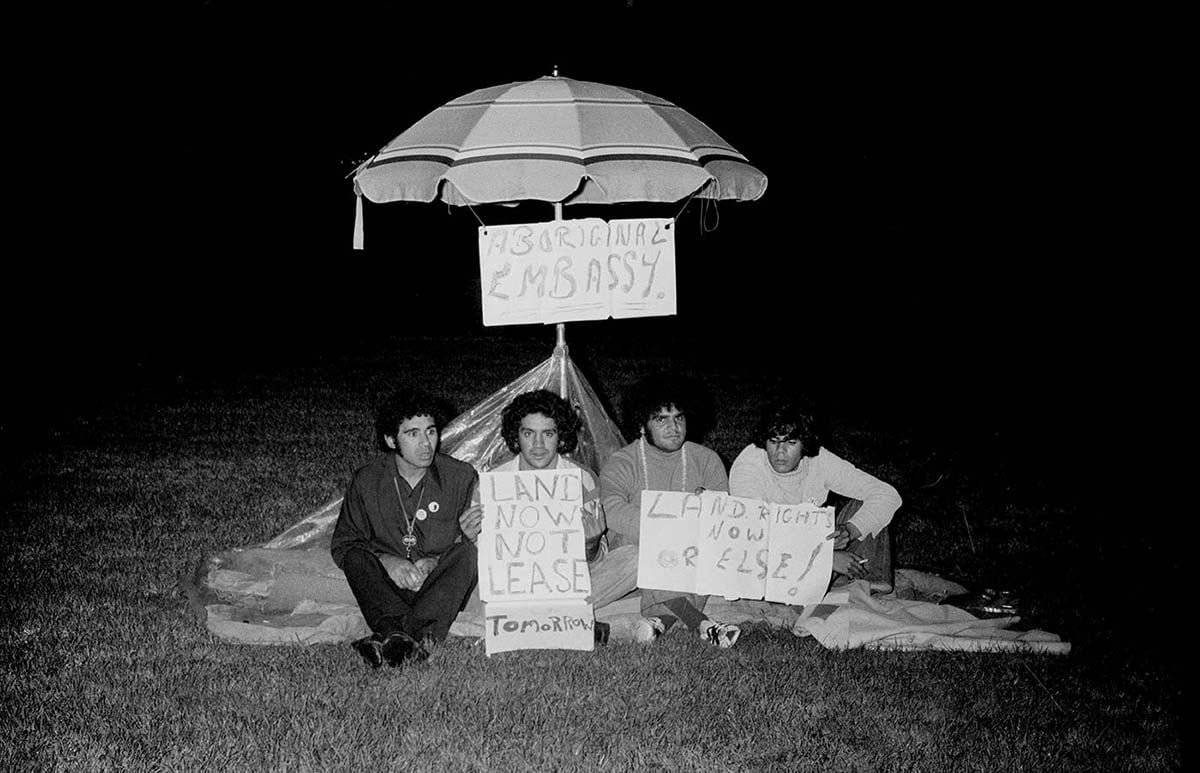
The Aboriginal Tent Embassy
The Aboriginal Tent Embassy represented a call to recognise Aboriginal people's rights to self-determination, land rights, and sovereignty. The embassy was a significant moment in Australian history, drawing attention to the ongoing struggle of Aboriginal people for equal rights and recognition.
On 27 January 1972, the USA and North Vietnam signed a peace agreement, marking the end of the Vietnam War. Australia had been involved in the war since 1962and the peace agreement signalled the end of Australia's involvement. It marked the beginning of a new era in Australian foreign policy.
On 5 March 1972, the last Australian logistic units left Vung Tau, ending Australia's direct military involvement in the Vietnam War. From then on, Australia's commitment to South Vietnam returned to a training role with the 150-man Australian Army Assistance Group, Vietnam (AAAGV), and the Australian Army Training Team Vietnam (AATTV).
In 1972, Australia celebrated a moment as Douglas Nicholls, a distinguished Indigenous rights activist, became the first Indigenous Australian to be knighted. Sir Douglas Ralph Nicholls was influential in the fight for equal rights for Indigenous Australians. He grew up at Cummeragunja Aboriginal mission and became a talented footballer, playing in the Victorian Football Association and later the Victorian Football League. Nicholls' passion for equality and justice extended beyond his sporting career. He became an ordained pastor in 1945, dedicating his life to advocating for the rights of Indigenous Australians.
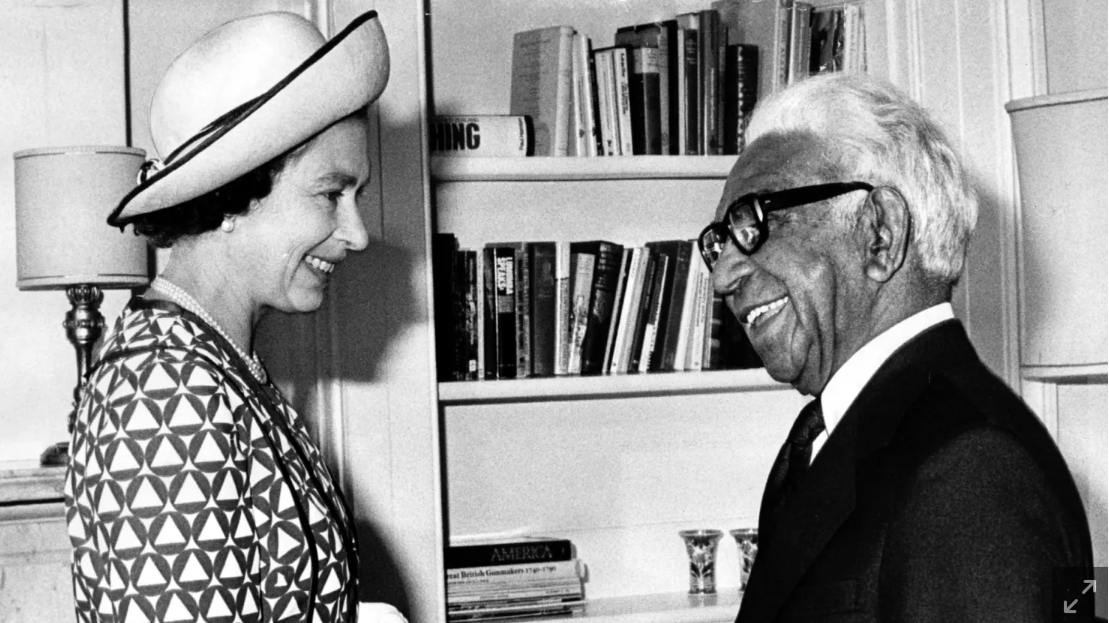
Queen Elizabeth with Sir Doug Nicholls. From The Age Archives
Sir Douglas Nicholls' achievements in 1972 signified a turning point in Australia's struggle for Indigenous rights. Throughout his life, Nicholls displayed exceptional leadership qualities, working closely with William Cooper, founder of the Australian Aborigines League (AAL), to lobby for Federal control of Aboriginal affairs. In 1957, Nicholls formed the Victorian Aborigines Advancement League, fighting against assimilation policies and working tirelessly to raise awareness of Indigenous issues. In 1972, the same year he was knighted, Australia witnessed a notable transformation in its cultural landscape. The famous music scene reflected the nation's evolving tastes and identity. At the same time, individuals like Sir Douglas Nicholls continued to fight for a more equitable society.
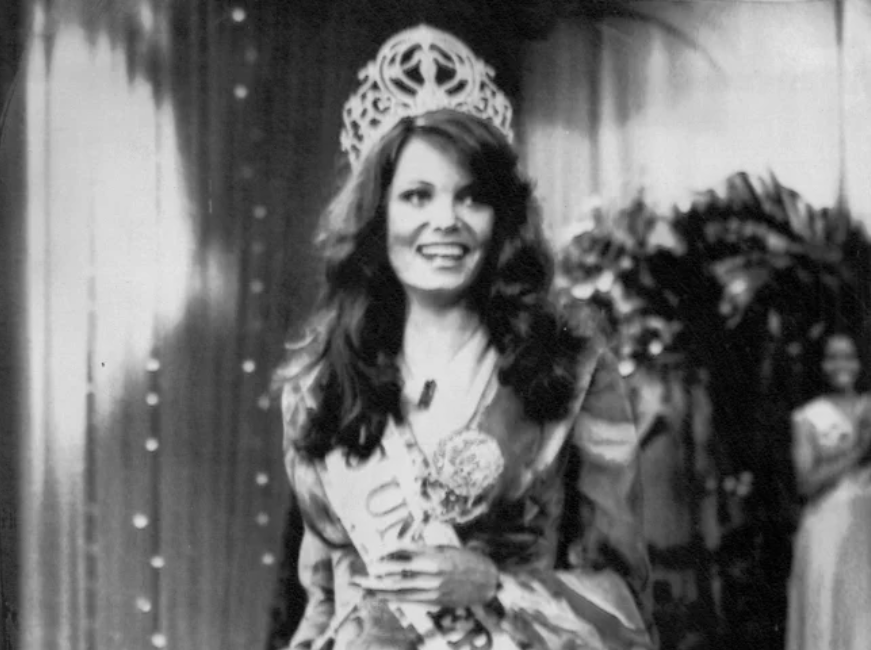
Kerry Wells after she was crowned Miss Universe, July 29, 1972
On 29 July 1972, Kerry Anne Wells became the first Australian to win the Miss Universe crown. Wells' victory represented a shift in the country's values, away from traditional British colonialism and towards a more diverse and inclusive culture.
On 15 November 1972, a significant event in Australia's aviation history occurred when Ansett Airlines Flight 232, bound for Alice Springs, was hijacked by a gunman. This marked the first aircraft hijacking in the country, leading to a dramatic gun battle at Alice Springs Airport and leaving four people injured. The hijacking began when Miloslav Hrabinec, a Czech migrant, emerged from the aircraft toilet armed with a sawn-off rifle and a sheath knife, announcing his intentions to a flight attendant. This terrifying event, now half a century old, remains a pivotal moment in Australia's aviation security history.
The incident unfolded with the crew and some passengers being held hostage for over four hours on a sweltering summer day in 1972. Eventually, negotiations led to a local pilot volunteering his light aircraft, accompanied by an undercover police officer. A gunfight ensued, resulting in the hijacker being wounded and eventually taking his own life. Despite the traumatic experience, the crew members, including air hostess Kaye McLachlan, continued working in the airline industry. The event led to a re-evaluation of aviation security measures in Australia.
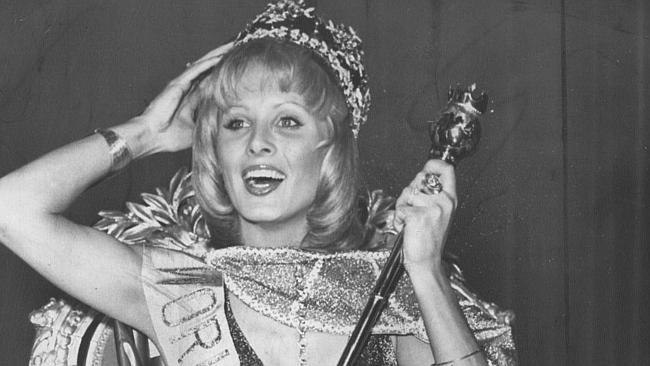 Belinda Green is crowned in 1972
Belinda Green is crowned in 1972
On 1 December, Belinda Green was crowned Miss World, marking another significant moment in Australia's cultural history. Green became the second Australian to win the Miss World crown, just a few months after Kerry Anne Wells was crowned Miss Universe. These two victories elevated Australia's international profile and contributed to the nation's growing cultural identity.
On 2 December 1972, the Australian Labor Party, led by Gough Whitlam, defeated the Liberal/Country Coalition government led by Prime Minister William McMahon. Whitlam became Australia's first Labor Prime Minister since the defeat of Ben Chifley in 1949, ending 23 years of conservative rule in Australia and marking a significant shift in the country's political landscape.
On 5 December 1972, the Australian government ended conscription, and draft resisters were released from jail, with pending prosecutions for draft resistance being dropped. The same month, on 8 December 1972, Australia's military commitment to South Vietnam ended. However, controversy about the precise end date of the war continued. The end of conscription and Australia's military involvement in the Vietnam War significantly shifted the country's foreign policy. They contributed to a growing anti-war sentiment in Australia.
The Paris Peace Accords, signed on 27 January 1973, marked the official end of the Vietnam War. The Accords aimed to establish a ceasefire and facilitate a political solution, calling for a complete withdrawal of US and allied forces, the release of prisoners of war, and a political process for South Vietnam's future. Australia, part of the US-led coalition forces, had a significant military presence in Vietnam. Following the signing, Australia gradually withdrew its military forces. The last combat troops left in March 1972; all personnel were removed by mid-1973.
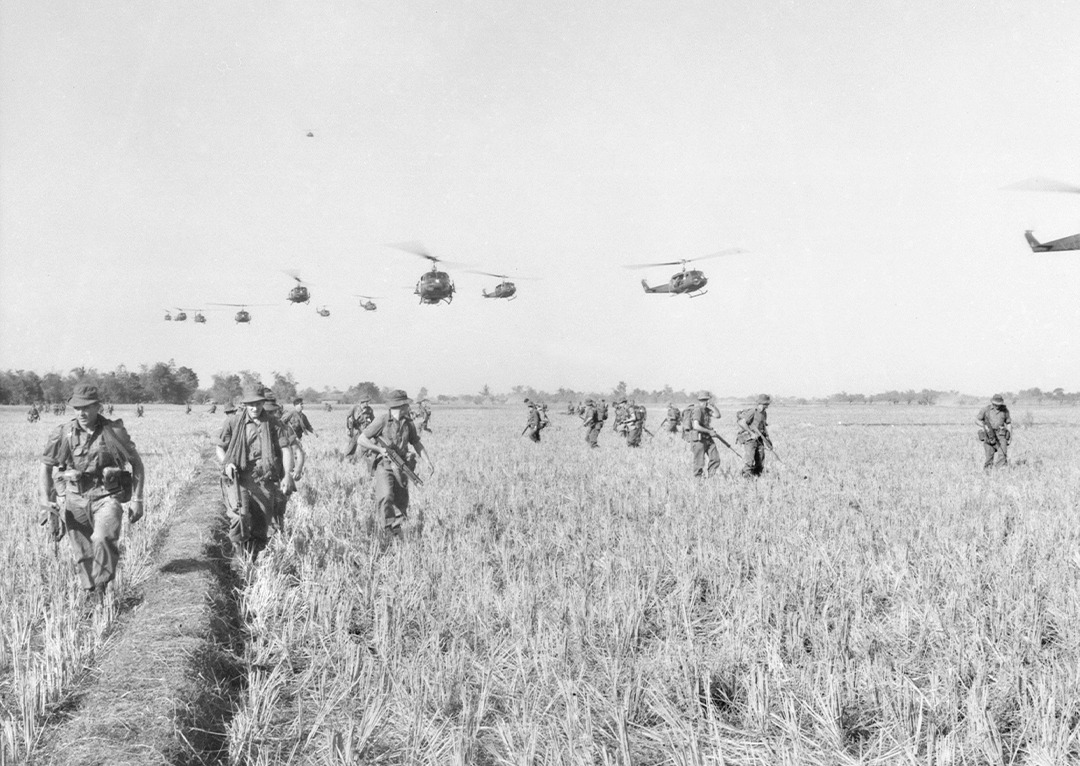
On 23 January 1973, US President Richard Nixon announced "peace with honour" in Vietnam, marking the end of America's involvement in the war. This signalled the end of a divisive period in American history and represented a significant moment in the global political landscape. The ceasefire on 27 January 1973 marked the war's official end, beginning a new era in Vietnam's political and social landscape.
In conclusion, 1972-73 marked a pivotal period in Australian history, witnessing significant political, social, and cultural changes that have shaped the nation's identity. The construction of the Aboriginal Tent Embassy in 1972 was a landmark event in the struggle for Indigenous rights and recognition. The end of Australia's involvement in the Vietnam War brought about a new direction in foreign policy.
The achievements of prominent Indigenous individuals, such as Douglas Nicholls, and the international recognition of Australian beauty queens helped to redefine the nation's cultural identity. The rise of the Australian Labor Party in 1972 marked the end of a long period of conservative rule, bringing about a significant shift in the country's political landscape. As we look back on this transformative era in Australian history, it is essential to remember the milestones that have paved the way for the diverse, inclusive, and progressive nation we know today.
This was the last in the Life and Times of Vietnam War series. Did you miss out on any of the years? Read the entire history in chronological order here.
Music of 1972
During the transformative period of 1972-73 in Australia, the music scene offered a diverse and eclectic mix of tunes that captured the era's essence. Amidst the significant political, social, and cultural changes taking place, the Australian public found solace in the sweet melodies of Donny Osmond's "Puppy Love," the heart-wrenching ballad "Without You" by Nilsson, and the catchy instrumental "Popcorn" by Hot Butter. This playlist provides a nostalgic trip down memory lane. It serves as a soundtrack to a time when Australia underwent a tremendous change, reflecting the nation's evolving tastes and growing cultural identity.
|
No. |
Song Title |
Artist |
|
1. |
"Puppy Love" |
Donny Osmond |
|
2. |
"Without You" |
Nilsson |
|
3. |
"Popcorn" |
Hot Butter |
|
4. |
"American Pie" |
Don McLean |
|
5. |
"Rangers Waltz" |
The Mom and Dads |
|
6. |
"Boppin' the Blues" |
Blackfeather |
|
7. |
"Daddy, Don't You Walk So Fast" |
Wayne Newton |
|
8. |
"The First Time Ever I Saw Your Face" |
Roberta Flack |
|
9. |
"Cherish" |
David Cassidy |
|
10. |
"Amazing Grace" |
The Pipes and Drums and the Military Band of the Royal Scots Dragoon Guards |
|
11. |
"Brand New Key" |
Melanie |
|
12. |
"Most People I Know Think That I'm Crazy" |
The Aztecs |
|
13. |
"Alone Again (Naturally)" |
Gilbert O'Sullivan |
|
14. |
"Long Haired Lover from Liverpool" |
Little Jimmy Osmond |
|
15. |
"Sylvia's Mother" |
Dr Hook |
Join the Conversation
We're helping Australians of all ages better understand the life and times of our Vietnam Veterans as we commemorate the end of Australia's involvement in the war 50 years ago. We're sharing interesting social bits and pieces from the Vietnam War era to give you a feel of the world back then, but most importantly we're sharing your memories, stories, and pride. Your memories of the Vietnam era; your family growing up in the 1960s and 70s; or stories you have about the life and times of your veteran dad, pop, uncle, or aunt will breathe life into their story. Share your pictures, anecdotes, and memories so others can see our veterans as more than soldiers. We honour, respect and admire, but few know. Help us honour our Veterans.






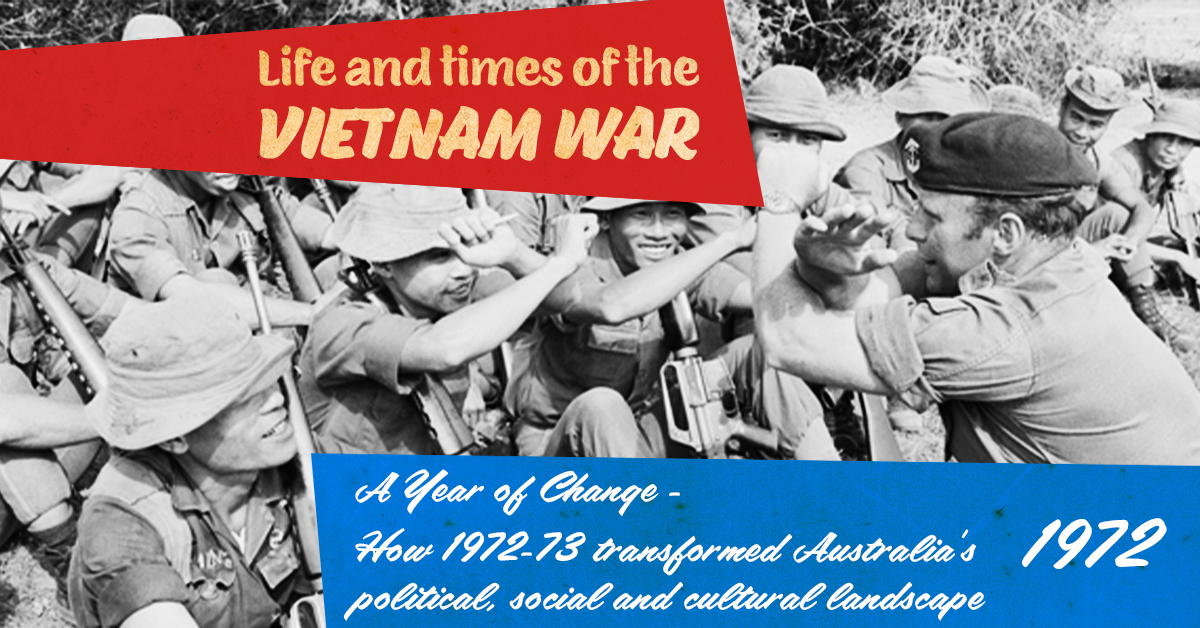
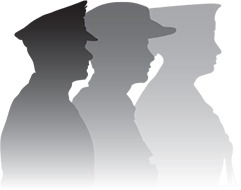

Leave Comment